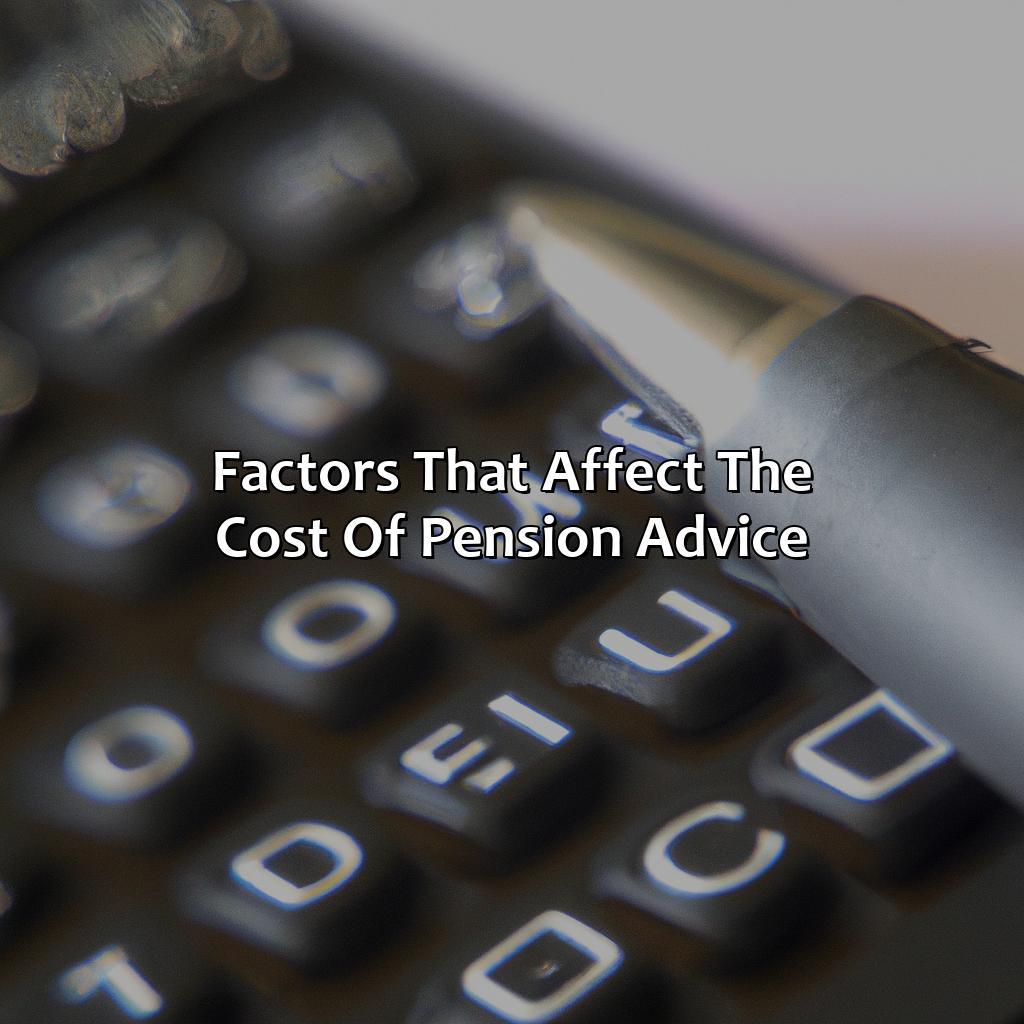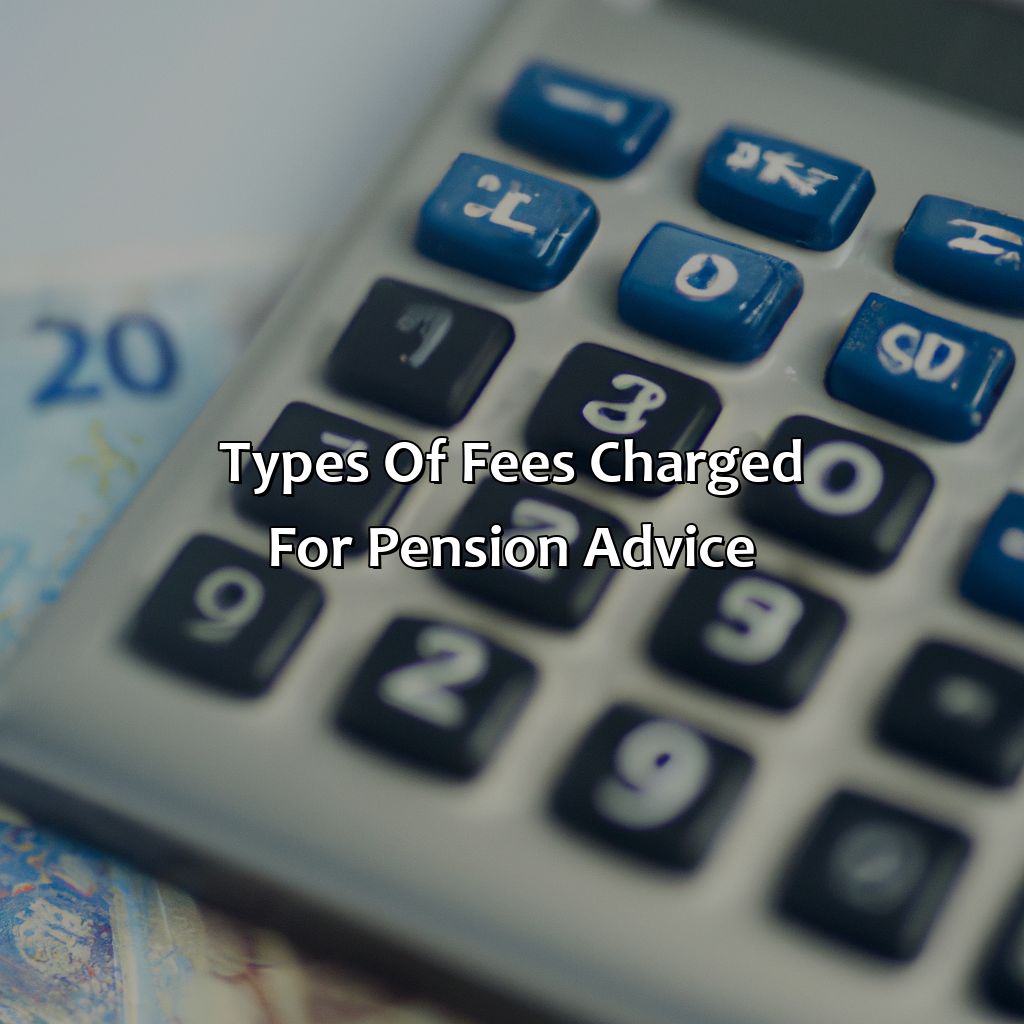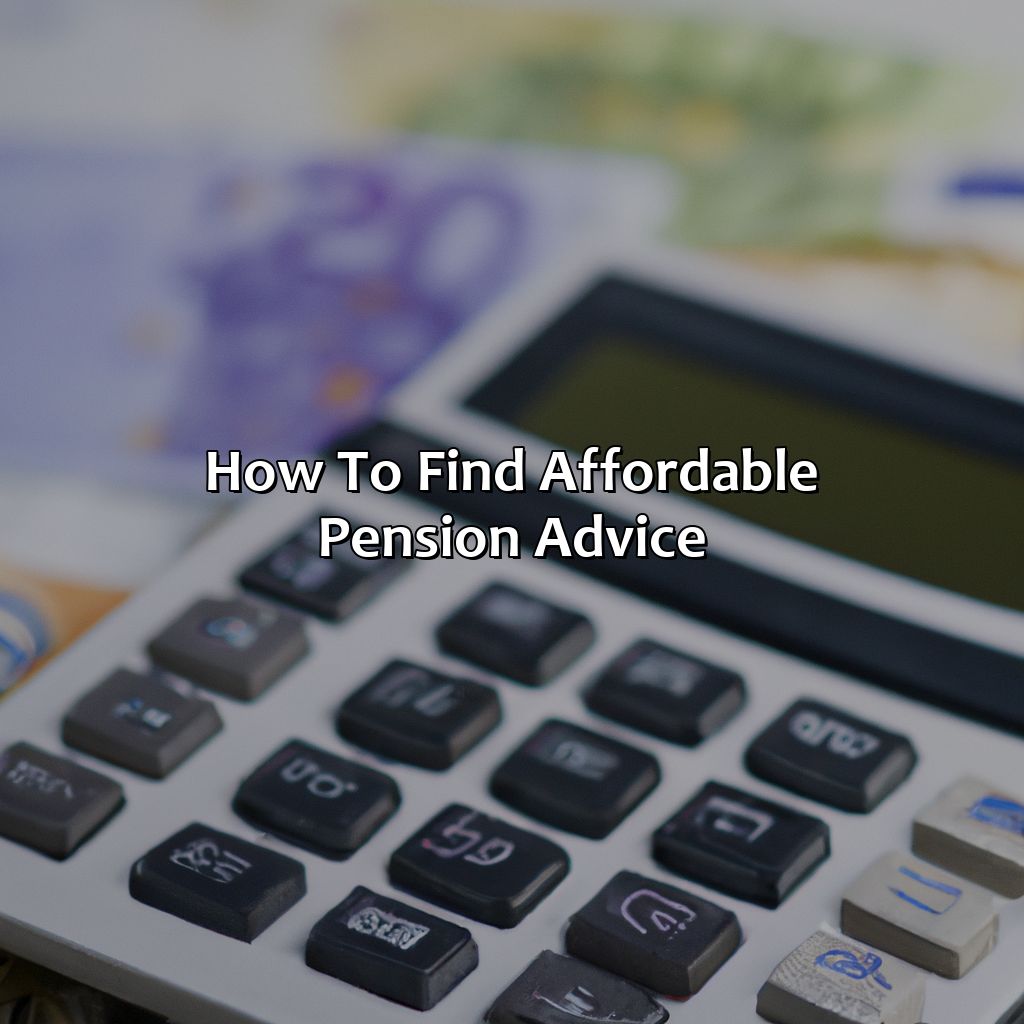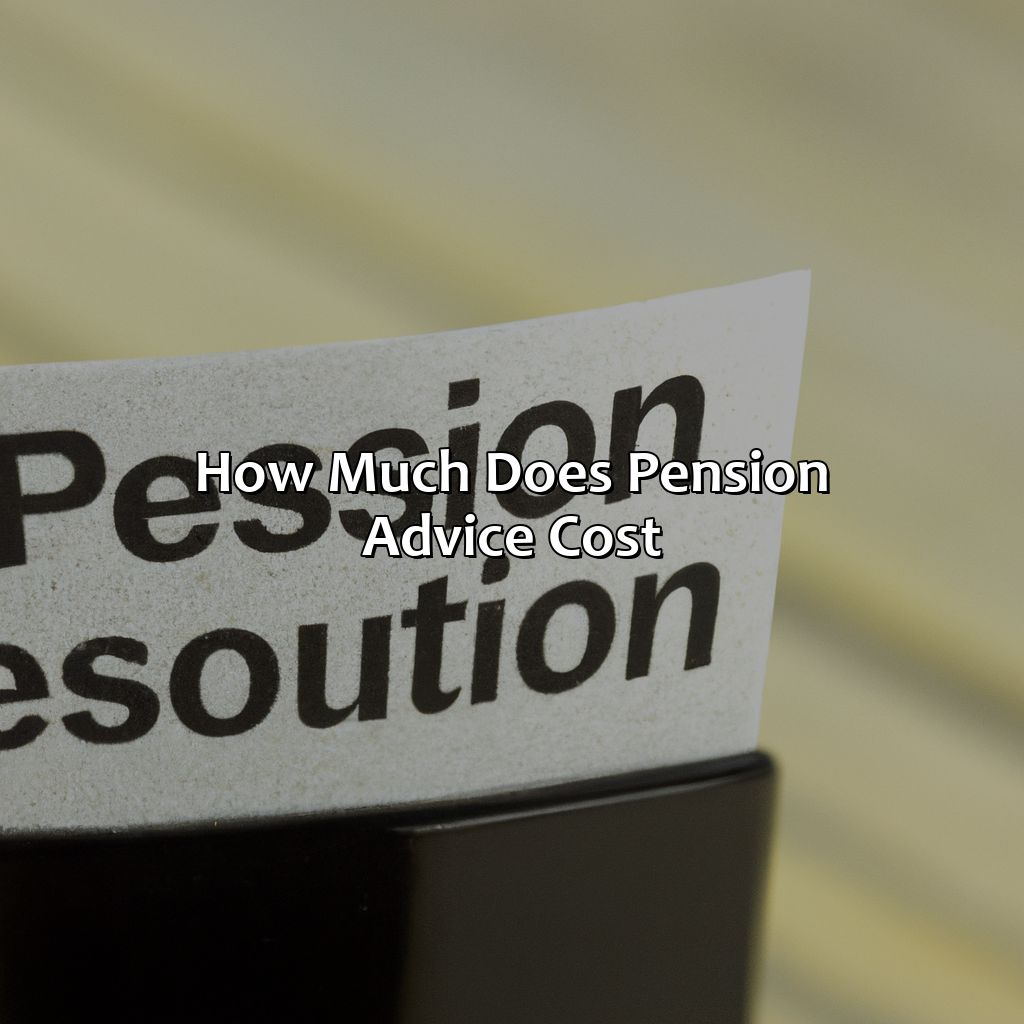How Much Does Pension Advice Cost?
Key Takeaway:
- The cost of pension advice is determined by several factors, including the level of service needed, professional experience and qualifications, complexity of the pension portfolio, and type of advice required.
- There are three main types of fees charged for pension advice: fixed fees, percentage of assets fees, and hourly rates. It’s important to understand the fee structures of different advisers to choose the most suitable option.
- To find affordable pension advice, it is essential to shop around and get referrals from trusted sources. Additionally, checking government support programs, negotiating fees with advisers, and considering group advice sessions can help reduce costs.
Are you overwhelmed by the complexities of pension planning and the associated costs? Look no further, this blog will provide you with the answers you need to make an informed decision. You’ll understand how much pension advice costs and why it’s a worthwhile investment.
Factors that Affect the Cost of Pension Advice
Gaining insight into the factors that influence the cost of pension advice starts with exploring particular aspects. Professional abilities, complexity of the pension portfolio, and type of advice required are the four main pieces to consider. Examining each of these parts will help you comprehend what affects the price of pension advice. Level of service needed is another factor to keep in mind.

Image credits: retiregenz.com by Adam Washington
Level of Service Needed
The extent of services required plays a crucial role in determining the cost of pension advice. Simpler service levels that involve basic guidance on retirement planning may be less expensive than more comprehensive services that include investment management, tax planning, and estate planning. Additionally, factors like the level of expertise and experience of the advisor, as well as their geographic location can influence the cost.
It’s important to note that while some advisors charge hourly rates or a fixed fee for one-time consulting services, others may ask for an ongoing percentage of assets under management. In these cases, clients could end up paying significantly higher fees over time.
It’s also worth considering that there may be additional costs associated with pension advice such as platform fees for investment products or charges related to implementing financial plans.
Research conducted by Moneyfacts.co.uk revealed that consumers could pay between 50 and 400 per hour to access independent financial advice in the UK. However, these figures vary widely depending on geographical locations and other factors.
Expertise isn’t the only thing that matters in pension advice, but it’s definitely a good start.
Professional Experience and Qualifications
The level of experience and qualifications possessed by a pension advisor can impact the cost of their services. Advisors with extensive experience and higher qualifications may charge more due to the added value they bring to the table. Additionally, advisors with specialized knowledge or certifications may also have higher fees.
When choosing a pension advisor, it is essential to consider their experience and qualifications carefully. While a less experienced advisor may be more affordable, they may not have the necessary skills or knowledge to provide comprehensive advice. It is advisable to strike a balance between affordability and quality when selecting an advisor.
It is also worth noting that different types of pensions may require different expertise from an advisor. For example, advising on defined benefit pensions may require more experience and qualifications than advising on defined contribution plans. It is essential to consider your specific needs when selecting an advisor. If you’re wondering how much you should pay into your pension, it’s important to consult with a trusted advisor who can guide you through the process.
Pro Tip: When selecting a pension advisor, look for someone who has experience and qualifications specifically relevant to your needs. They should be able to demonstrate their expertise in the area of pension advice you require.
Managing a pension portfolio is like trying to solve a Rubik’s cube, except all the colors are could-be potential losses.
Complexity of the Pension Portfolio
The intricacy of one’s retirement fund arrangement can greatly impact the cost of obtaining pension advice. Pension portfolios that are more complex require more in-depth analysis, which can translate into higher advisory costs. This variation can vary from individual to individual, depending on criteria such as the number of pension pots and the type of pensions held (i.e., final salary or defined contribution).
Furthermore, a complicated portfolio may necessitate specialized input from advisors with detailed knowledge of specific areas like taxation or inheritance planning. As a result, clients must be prepared to pay extra for these sophisticated services and expertise.
It is also crucial to keep in mind that increased complexity equates to additional time spent with advisers preparing recommendations and examining alternatives, resulting in increased fees. It’s critical to note that failing to engage skilled aid when dealing with intricate portfolios may have significant consequences; the cost of engaging an advisor is frequently far less than the expense of fixing issues following poorly advised decisions. If you’re wondering what pension income splitting is in Canada, it’s important to seek the advice of a professional.
To avoid missing out on important information, it is critical not to cut corners when it comes to acquiring pension advice. Working with experienced professionals who have a thorough grasp of all aspects of this complex field can help pave the path toward a financially secure retirement plan.
It’s important to understand how much pension in UK in order to make informed decisions about your retirement plan.
Choosing the right type of pension advice is like playing a game of chess, except the stakes are higher and the pieces are retirement funds.
Type of Advice Required
The nature and extent of pension advice required can have a significant impact on the overall cost. The complexity of the individual’s financial situation, the type of pension scheme involved and the desired outcome are all factors to consider when determining the cost of receiving pension advice.
Depending on one’s financial goals, they may require one-time advice or ongoing advice to assess and monitor their retirement plan. Since different pension plans provide different income streams and benefits, this will need to be factored into planning. Defined Benefit (DB) pensions are likely too complex for non-experts to comprehend, whereas Defined Contribution (DC) pensions will be relatively straightforward.
If you’re wondering how many years you have to work in Canada to get a pension?, the answer depends on a variety of factors and varies by plan. It’s important to do your research and talk to a professional for personalized advice.
It is crucial that individuals with a wide range of obligations understand how much pension advice costs as well as what it entails. The expenses associated with consulting an expert must also factor in overhead expenditures like company rents, staffing hours or fees for software tools used during research.
A few years ago in 2017-18, various changes were made in regulations governing pay scales for finance advisors. As a result, most financial advisers were forced to increase their service costs. Also, those who charged hourly rates included additional fees (up to 250 per hour) which added up quickly depending on complexity.
Why trust a financial advisor with your retirement savings when you can just throw a dart at a board of fees and hope for the best?
Types of Fees Charged for Pension Advice
Understand fees for pension advice. There are three common types of fees for pension advice:
- Fixed fees
- Percentage of assets fees
- Hourly rates
Check out the sub-sections to decide which one is right for you. Let’s take a closer look at each one:

Image credits: retiregenz.com by Adam Arnold
Fixed Fees
The charges for pension advice can vary depending on various factors. One of the common types of charges is called “Set Fees”. In this pricing model, a fixed fee is charged for the overall service, regardless of the amount invested or type of pension scheme. It provides transparency and gives peace of mind to customers about the final fee.
Fixed fees are often sought after by customers because it offers a clear assessment of how much they need to pay. This type of charge doesn’t rely upon any hidden cost or percentage of the invested or managed funds. Therefore, it’s more comfortable from both parties’ perspectives as they have peace of mind that there won’t be any surprises with extra fees after the service has been completed.
It is worth noting that some firms impose limitations on their set-fees such as restrictions on follow-up consultations and access to new regulatory developments. Customers should ensure that all costs and benefits are detailed upfront before committing themselves. If you’re wondering when do you pay taxes on a pension plan, it’s important to seek advice and understand the costs involved.
One retired couple once received confusing financial advice that ultimately led them to acquiring inappropriate savings plans that were unsuited to their circumstances. They learned that rather than focusing entirely on low-cost offers advertised online, it’s always best to seek a reputable advisory firm, very clear in their pricing models before jumping headlong into investment opportunities. If you want to pay a percentage of your assets for pension advice, just remember – the only guarantee in life is death, taxes, and fees.
Percentage of Assets Fees
Investment advisory fees calculated as a percentage of an individual’s assets under management is a commonly used fee structure. This fee structure is designed to align the interests of the investor and their adviser, as advisers only earn income when clients’ investments generate profits.
A table showing the Percentage of Assets Fees charged by pension advisors has been provided below:
| Portfolio Size | Percentage of Assets Fee |
|---|---|
| Less than 50,000 | Around 1% |
| 50,000 to 100,000 | Around 0.75% |
| 100,000 to 500,000 | Around 0.5% |
| Above 500,000 | About 0.25% |
It is important to note that these fees may vary and are subject to negotiation between the client and adviser. Other factors may also impact these charges such as the specific services requested or additional financial products obtained through the adviser.
Pro Tip: Ask your financial advisor about any potential conflicts of interest that could arise from their compensation arrangements before signing on for investment advice.
Watch your pension disappear quicker than a magician’s assistant with these hourly rates.
Hourly Rates
When it comes to obtaining pension advice, the fees for hourly consultations are an important consideration. These charges may fluctuate depending on various factors such as location, experience of the advisor, and the complexity of financial plans.
Hourly rates for pension consultation vary but typically range from 75 to 350 per hour. When calculating hourly rates, firms usually factor in several variables such as overhead expenses, operational costs and profit margins. Clients should be aware that advisors charge different hourly rates for different aspects of pension advice.
In addition to giving advice on pensions alone, your advisor may provide a holistic retirement planning service where they could also offer assistance with inheritance tax planning or estate planning. This is most commonly offered as a package deal rather than at an hourly rate.
It is essential that clients find an accredited advisor with substantial experience who is registered with the Financial Conduct Authority (FCA). The FCA offers a register of regulated advisers and can help you find one in your local area.
To keep costs down when seeking pension advice, clients should pick which areas require attention or draw up a list of questions ahead of time to make the most efficient use of their consultation time. It would save money in advance if they have knowledge about their requirements and what type of advisory assistance will be necessary before meeting with their advisor. Check out this article on how much you can earn while on pension credit to learn more about pension options.
Saving for retirement is like a game of Tetris – finding affordable pension advice is the missing block that completes the line.
How to Find Affordable Pension Advice
For cheap pension advice, look into:
- Shopping Around
- Asking for Referrals
- Examining Government Support Programs
- Negotiating Adviser Fees
- Thinking About Group Advice Sessions
These are all possible solutions!

Image credits: retiregenz.com by James Washington
Shop Around
When it comes to finding affordable pension advice, wise consumers are quick to employ the technique of information comparison. Here are three key ways you can compare your options more effectively:
- Consult multiple sources: The first step to making an informed decision is seeing what different providers have to offer; don’t just rely on a single course of advice.
- Assess costs and credentials: In comparing services, consider not just the upfront cost for advice but also any additional costs you might need to pay throughout the lifetime of your plan. Be sure advisors hold the right qualifications and permissions, too.
- Investigate customer feedback: Checking online reviews as well as personal recommendations can help you gain valuable insight into which advisors have strong track records among their clients.
As with any search for a professional service, industry-specific details apply for pensions guidance that speak to time-tested strategies when whittling down potential candidates. Browse beyond introductory webpages or advertisements in order to complete thorough research of each option’s offerings and pricing points, delving deeper into essential planning guidelines for even better results.
Why rely on Google when you can get referrals from friends and family who have already made all the pension mistakes for you?
Get Referrals
When seeking pension advice, acquiring recommendations is a prudent and strategic way to explore affordable options. Here are 6 ways to follow that can help you obtain quality referrals:
- Ask friends or family members if they have utilized pension advisors, and how much it benefited them.
- Search online for reviews of local pension advisors. However, take note of potential limitations such as fake or biased reviews.
- Inquire from professional organizations such as The Personal Finance Society or independent financial advisory firms about trusted advisors in your area.
- Check with the Financial Conduct Authority (FCA) to ensure the recognized advisor is eligible to provide consultations.
- Contact auto-enrollment pension providers like NEST or pensions support services like Pensions Wise for advice on suitable advisors in your area.
- If you already have a specialized financial advisor, ask if they offer such services and who they recommend for impartial advice.
It’s always better to seek referrals from multiple sources before selecting an advisor. It’s essential to ensure that the advisor fully understands your requirements and offers transparent and sustainable solutions.
Remember, when looking for affordable pension advice, low-cost alternatives may not always be the best solution. Opting for a highly qualified and knowledgeable advisor may save you more money in the long run, as better-informed decisions can lead to optimal pension returns.
Want to save money on pension advice? Check out government support programs – because who needs a financial advisor when you have the power of bureaucracy?
Check Government Support Programs
The government offers support programs that may assist individuals in obtaining affordable pension advice. This can contribute significantly towards ensuring a secure retirement and financial independence post-retirement.
- State Pension
- Pension Credit
- The Pension Tracing Service
- The Financial Services Compensation Scheme (FSCS)
- Pension Wise
- The Money Advice Service
In addition to these programs, the government also offers relief on tax payments when contributing towards pension schemes. It is worthy to note that not all support systems are suitable for everyone, and careful evaluation of each program, along with professional advice, is recommended before making decisions about pension plans.
To ensure that you benefit from these support programs, it is essential to keep up-to-date with any updates or changes made. Failure to do so may lead to missed opportunities, which could result in unnecessary costs and expenses in the long run.
Don’t miss out on the opportunity to take advantage of government support programs and obtain affordable pension advice. Act quickly by exploring your options and speaking with a trusted advisor today. Wondering how much Canada Pension Plan you will receive? Get in touch with our experts to find out.
Negotiating fees with pension advisers is like haggling with a dentist about the price of a root canal, but with less Novocain.
Negotiate Fees with Advisers
When searching for affordable and reliable pension advice, it is important to consider Negotiating Fees with Advisers. Here are four key points to keep in mind:
- Be transparent about your budget and expectations upfront
- Ask for a breakdown of all fees and charges
- Consider hiring an adviser on a retainer or project basis
- Don’t be afraid to shop around and compare quotes from different advisers
It’s also worth noting that some advisers may be open to negotiating their fees based on the complexity of your specific situation or other factors. However, be cautious of advisers who offer drastically lower fees than their competitors, as this could be a red flag for incompetence or inadequate experience.
Many people are hesitant to negotiate with advisers due to common misconceptions about how the industry works. It’s important to remember that fees are not set in stone, and finding an adviser who is willing to work within your budget can ultimately save you money in the long run.
In fact, there have been instances where clients were able to negotiate significantly lower fees with their adviser simply by being straightforward and honest about their financial situation. By taking control of the negotiation process and advocating for yourself, you may find that securing affordable pension advice is easier than you think!
Consider Group Advice Sessions.
Opting for group pension advice sessions can be a cost-effective solution. In such settings, individuals are provided with the same level of support and guidance as they receive in one-to-one consultations. Group sessions also promote learning from each other’s perspectives and questions.
Group advice sessions cater to people who seek professional guidance but are constrained by limited finances. Participants can benefit from the economies of scale, getting access to financial advisors’ expertise at a lower cost. Additionally, it provides individuals a sense of community where they get to exchange personal experiences related to retirement planning.
It is important to note that group pension advice sessions do not compromise on the quality of service received by individuals but ensure affordable solutions. The Financial Conduct Authority regulates all financial advisory services, including how much SSS pension will I get in group sessions.
According to an online survey conducted by money.co.uk, attending group pension advice sessions can save more than half the cost incurred in individual pension consultations. If you’re wondering how much pension credit is a week, it’s important to get advice from a qualified professional to ensure you receive all the benefits you’re entitled to.
5 Facts About Pension Advice Costs:
- ✅ The cost of pension advice varies and can range from 75 to 2,500 depending on the complexity of the advice required. (Source: Which?)
- ✅ Pension advisors are required to disclose their fees upfront, including any ongoing fees or commissions. (Source: Money Advice Service)
- ✅ Many financial advisors offer a free initial consultation to discuss pension options and costs. (Source: Telegraph)
- ✅ The cost of pension advice may be tax-deductible. (Source: The Guardian)
- ✅ It is important to shop around and compare pension advisor fees before making a decision. (Source: MoneySuperMarket)
FAQs about How Much Does Pension Advice Cost?
1. How much does pension advice cost?
The cost of pension advice varies depending on the advisor and the type of advice needed. Some advisors charge a flat fee, while others charge a percentage of the assets they manage. On average, you can expect to pay between $500 and $2,000 for pension advice.
2. What factors affect the cost of pension advice?
There are several factors that can impact the cost of pension advice, including the advisor’s experience and credentials, the complexity of your pension plan, and the amount of assets involved. Additionally, some advisors may charge more for ongoing advice and monitoring.
3. Can I get free pension advice?
While there are some resources available for free pension advice, such as government-sponsored services and online tools, it may be limited in scope and tailored to specific situations. If you require more personalized advice, you will likely need to pay for it.
4. Is it worth paying for pension advice?
It depends on your individual situation. If you have a relatively straightforward pension plan and are comfortable making decisions on your own, you may not need to pay for professional advice. However, if your pension plan is more complex, or you are unsure of your options, the cost of pension advice may be well worth the investment.
5. Can I negotiate the cost of pension advice?
It is possible to negotiate the cost of pension advice, but it may depend on the advisor and their fee structure. Some advisors may be willing to offer a discount or reduce their fees for certain clients. It never hurts to ask and see if there is any room for negotiation.
6. How do I find a reputable pension advisor?
One way to find a reputable pension advisor is to ask for referrals from friends, family, or colleagues. You can also research advisors online, ensuring they have the appropriate credentials, such as being registered with a professional organization like the Financial Industry Regulatory Authority (FINRA). Additionally, you can check customer reviews and testimonials to get a sense of the advisor’s reputation.
